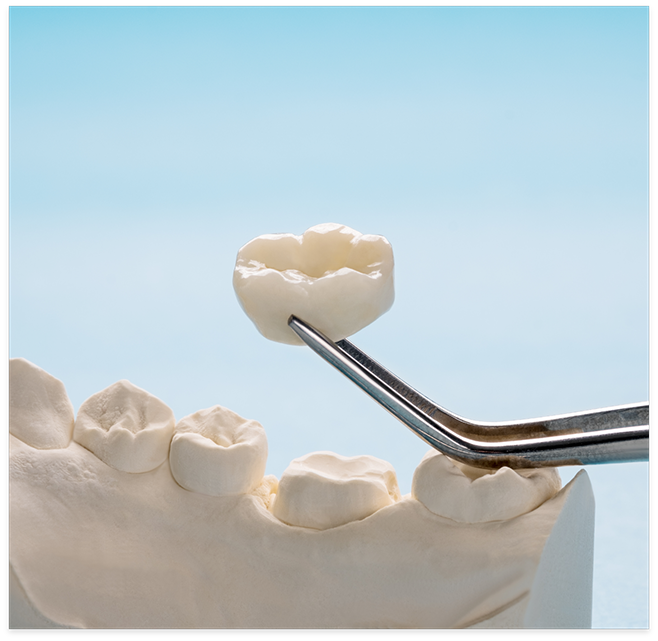Dental Crowns Cottonwood Heights
Strong Restorations for Your Smile
Even if you diligently brush and floss, your teeth might suffer decay or cavities. That’s only natural, as such things can happen to anyone. Still, you don’t have to live with such conditions – just get dental crowns in Cottonwood Heights! Using these prosthetics, we at White Peak Dental will help your smile look and feel amazing. Just keep reading or call our office for relevant details.
Why Choose White Peak Dental for Dental Crowns?
- High-Quality, Natural-Looking Dental Materials
- A Welcoming, Non-Corporate Dental Office
- We Accept & Maximize Dental Insurance
What is a Dental Crown?

In essence, a dental crown is a sort of “cap” that fits over a weakened tooth. Its main use is to protect, cover, and restore the shape of teeth. As such, the prosthetic is excellent at treating dental damage.
Given dental crowns’ features, the best candidates for them tend to have the following:
- Severe dental injury (or injuries)
- A large cavity that a filling can’t treat
- Teeth recently treated with root canal therapy
- A weakened smile that needs extra support to prevent fracturing
- Cosmetic imperfection(s) they want to address
Our office can confirm your candidacy for a dental crown by performing an oral exam. Should you qualify, we’ll explain how the procedure could go.
The Dental Crown Process

The first step of the crown process is to consult Dr. Hansen. This in-person visit lets you explain your smile goals, oral health needs, and medical history. That information, in turn, allows our team to settle on an appropriate treatment plan. (It’ll also help us see if you need preventive work before crown placement.)
Following the consultation, our team will prepare your tooth for its crown. In particular, we’ll remove bits of enamel so the prosthetic lays flush with surrounding teeth. Dr. Hansen will then take an impression of your smile, which will be used to make the final crown. Making this restoration will take time, though, so you’ll wear a temporary one until it’s ready.
The final placement is pretty straightforward. Once done, our office will explain how best to care for your new crown.
The Benefits of Getting a Dental Crown

Left untreated, a damaged tooth will suffer worse and worse health problems. In contrast, fixing one with a dental crown leads to benefits like:
- Tooth Protection: By covering a tooth’s damaged area, a crown protects your pearly white from harm. Namely, it keeps harmful bacteria at bay and prevents the need for invasive procedures later.
- A Great-Looking Smile: The zirconia used in dental crowns is tooth-colored. As a result, treatment results will blend seamlessly with the rest of your smile.
- Versatility: Because a crown can cover all kinds of tooth damage, it’s a highly versatile prosthetic. You can use one to treat tooth decay, cavities, dental injury, and more.
- Long Lifespan: So long as you care for it well, you can expect a crown to last at least 15 years!
Dental Crowns FAQs
Maybe you want to get dental crowns in Cottonwood Heights. It’d be great if you did – these restorations would make your smile prettier and healthier! Even so, knowing their relevant facts is still a good idea. Having them lets you confirm if treatment is right for you. Fortunately, we at White Peak Dental can help: below are some answers to commonly asked crown questions. Please read them over and learn about our dental caps. If you don’t find what you’re after, don’t hesitate to call our office for the details.
Do Dental Crowns Get Cavities?
Crowns themselves don’t get cavities – they’re not made of enamel. Still, the teeth beneath them can if you’re not careful.
Ultimately, a crowned tooth has the same risk of decay as an uncrowned one. Plaque and bacteria can gather around the former’s gumline, where the tooth meets the crown. They can then travel beneath the prosthetic and damage the underlying tooth.
Of course, you can prevent cavities in crowned teeth. Just do as you would for any other tooth: Brush twice daily, floss once daily, and attend regular dental checkups.
How Long Do Dental Crowns Last?
The average dental crown lasts anywhere from five to 15 years. That said, this number can vary based on relevant factors. These include:
- Diet: Most foods are safe to eat with a crown. However, some can cause the prosthetic to loosen or break.
- Oral Hygiene: If you don’t care for your smile, your crowned tooth could get a cavity or an infection. Should that happen, a dentist would remove the crown to treat your issue.
- Bad Oral Habits: Chewing on fingernails or ice can crack a crown. Similarly, smoking often triggers gum disease, which leads to crown failure.
- Crown Location: Crowns on front teeth last slightly longer than crowns on molars, as they don’t suffer as much wear and tear.
What’s the Difference Between a Temporary Crown and a Permanent Crown?
Per their name, temporary crowns aren’t made to be long-lasting. The result is that they differ in specific ways from permanent ones.
For example, the two types of crowns use different materials. The permanent kind is often made of porcelain or zirconia. Meanwhile, temporary crowns use acrylic or composite resin.
They also contrast in the bonding method. Dentists bond permanent crowns with a strong cement, thus ensuring a long treatment lifespan. However, temporary ones rely on weak cement so they can be removed later.
How Do You Know When a Dental Crown Needs to Be Replaced?
Ultimately, you can only settle whether a crown needs replacement with your dentist. They’ll take X-rays or perform an oral exam to confirm things. There are warning signs, though, that indicate a crown is nearing its end. Common ones are:
- Pain: If you have a toothache due to decay, the crown must be removed, and the cavity treated. The dentist can then assess whether the crown should be reseated or replaced.
- Instability: See your dentist when your crown is loose, especially from chewing something sticky.
- A Worsened Appearance: A chipped or discolored crown will harm your confidence. That alone is enough reason to replace it.
